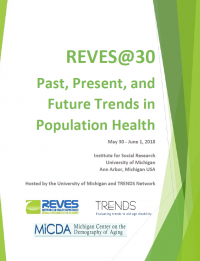2018 Ann Arbor, United States


This is a notice to save the date for REVES 2018.
REVES 2018 will be held May 30-June 1, 2018 (with an Analysis Workshop on May 29th) in Ann Arbor, Michigan, USA, at the Institute of Social Research at the University of Michigan. The theme of the meeting is: "REVES @ 30: Past, Present and Future Trends in Population Health". The call for abstracts will be out around the third week of November and abstracts will be due around the third week of January.
If you plan on attending and submitting an abstract, please take note of these dates.
More information is available on the conference website.
Conference organizers:
- Mary Beth Ofstedal, University of Michigan, USA
- Zachary Zimmer, Mount Saint Vincent University, Canada
Programme and presentation slides:
Session 1. Past, present and future trends in population health, part
- Crimmins E, Zhang Y, Kim JK & Levine M. “Changing disease, onset and mortality in two cohorts from the Health and Retirement Study”
- Schellekens JJ. “Explaining trends in disability in the United States, 1963-2013”
- Lefebvre J & Carrière Y. “Trends in the health status of Canadians aged 45 and over, 1994-2014”
- Riffe T, Mehta N, Schneider D & Myrskylä. “Healthy lives: Delayed onset, improved recovery, or mortality change?”
Session 2. A global look at risk factors
- Brønnum-Hansen H. “The impact of smoking on expected lifetime without and with chronic disease among Palestinian men in the West Bank”
- Kingston A, Byles J, Anstey K & Jagger C. “Impact of obesity on disability-free life expectancies in older Australians“
Session 3. Developments in measures and methods, part 1
- Galenkamp H, Deeg D, Braam A & Huisman M. “Self-rated health: when and how to use it in studies among older people?”
- Luy M, Di Giulio P, di Lego V, Lazarevič & Sauerberg M.“Could the actual decrease in life expectancy be caused by “Tempo Effects”?”
- Chei CL, Chan A, Malhotra & Saito Y. “Validity of the Global Activity Limitation Indicator (GALI) in an Asian setting”
- Brouard N, Shih YC & Giudici C. “The new Interpolated Markov Chain software (IMaCh 0.99) – backward prevalence from Italian SILC and French HID surveys – time varying covariates from the American HRS survey”
Session 4. Exploring social inequalities in health
- Cambois E, Garrouste C & Pailhé A. “A long-term harm of unskilled first jobs, episodes of inactivity and no promotion”
- Peele M. “Later-life health trajectories in China: The role of childhood, adult, and current community socioeconomic conditions”
- Duim E, Antunes JLF, Albala C, Duarte YAO & Fuentes-Garcia A. “Inequalities in trajectories of functioning in dwelling-living older adults in two developing countries: Brazil and Chile”
- Solé-Auró A & Lozano M. “Inequalities in longevity by education level in Spain: A life satisfaction approach”
Session 5. Life and health in comparative perspective
- Nusselder WJ, Valverde JR & Mackenbach JP. “A comparative study of inequalities in Unhealthy Life Years”
- Ehrlich JR. “Vision impairment among older adults in low and middle income countries”
- Bardo AR & Lynch SM. “U.S. regional differences in cognitive and happy life expectancy”
- Dowd JB & Zajacova A. “Trends in mid-life mortality: Is the US an anomaly? Evidence from the UK and Canada“
Session 6. Contemporary themes around health and mortality
- Qiao X, Wu J & Zhao X. “Changing of mortality and morbidity of Chinese elderly”
- di Lego V & Turra CM. “Vanguards of longevity: The case of Brazilian Air Force military”
- Gavrilova NS & Gavrilov LA. “New trend in the U.S. Mortality: Gompertzialization of Mortality Trajectory”
- Wolfson MC & Rowe G. “On unjust health inequalities“
Session 7. Past, present and future trends in population health, part 2
- Freedman VA. “Recent changes in active life expectancy in the US: An Introduction to NHATS (National Health and Aging Trends Study)”
- Parmar MC & Saikia N. “Regional analysis of compression of mortality and morbidity in India: 1995-2014”
- Zajacova A & Zimmer Z. “The rising pain prevalence among US and Canadian adults: A comparative study”
George Myers Lecture
Session 8. Developments in Measures and Methods, Part 2
- Weeks JD. “Future directions of Functioning Measures in the U.S. National Health Interview Survey (NHIS)“
- Wolf D & Montez JK. “Heterogeneity in active life expectancy: A finite mixture model”
- Wolfson MC & Bijelic V. “Unobserved heterogeneity and the robustness of estimates of the effects of income on life expectancy – An illustrative and hypothetical example“
- Van Oyen H, Bogaert P, Beluche I, Cambois E & Robine JM. “The use of the Global Activity Limitation Indicator (GALI) and Healthy Life Years by Member States and the European Commission”
Session 9. Investigations pertaining to the older-old, the last years of life and frailty
- Hoogendijk E. “Sex differences in healthy life expectancy among nonagenarians: A multistate survival model using data from the Vitality 90+ study”
- Herr M, Arvieu JJ, Ankri J & Robine JM. “Life expectancy in the state of frailty after age 70: findings in the SIPAF Study”
- Zazueta-Borboa JD & Ham-Chande R. “Health status and out-of-pocket spending during the last year of life in Mexican Population 60+”
- Malhotra R, Visaria A, Chei CL, Chiu CT, Allen JC, Ma S, Wong CH, Chan A, Saito Y, Østbye & Matchar DB. “Years of life lived by elderly Singaporeans with and without frailty”
Session 10. Cognition and dementia research
- Lynch SM & Bardo AR. “Cognitive and happy life expectancy in the US: Implications of differential measurement of cognitive impairment and happiness for estimates of quality of life”
- Farina M, Hayward M, Crimmins E & Kim JK. “Race and education disparities in dementia-free life expectancy for older Americans”
- Ailshire J. “Regional variation in U.S. dementia trends and race/ethnic disparities in cognitive impairment and dementia”
- Andrade F. “Educational differentials on life expectancy with and without cognitive impairment in Brazil”
Poster Presentations (prize winners denoted by *):
- *Libby G, Zimmer Z, Chiu CT, Ofstedal MB, Saito Y, Haviva C & Jagger C. “To what degree do religiosity and spirituality explain healthy life expectancy gaps across Europe?“
- Teerawichitchainan BK & Loichinger E. “Sensory impairments among older persons in Myanmar, Vietnam, and Thailand: Implications for functioning and health”
- Sonnega A, Leggett A, Pepin R & Assari S. “Running to rest: Physical activity and sleep problems over 10 years in a national sample of older adults”
- Ahmed MEH “Healthy life expectancy and the correlates of self-rated health in Central Sudan. A Cross sectional study”
- Mulhorn KA, Dugan J & Booshehri L. “Functional decline and all-Cause mortality based on respondents in US nursing home survey (2004-2006)”
- *Lee H, Ofstedal MB, Smith J. “Childhood family environment and cognitive functioning in later life: Evidence from the HRS Life History Mail Survey”
- Yang Y. “Can regular fruit consumption reduce the risks of cognitive impairment? — Evidences from a large-scale social survey”
- Ojima T, Hosokawa R, Horii S, Yokoyama Y, Aida J, Saito M, Kondo N & Kondo K. “Life expectancy without institutionalization as an operational measurement of age and dementia friendly communities”
- Teerawichitchainan BK, Ha JH & Knodel J. “Childlessness and aging alone: Comparative perspectives from East and Southeast Asia”
- *Lazarevic P & Brandt M. “Self-rated health as generic health measurement? Identifying the health information used and the role of gender, age, and country”
- Raichur V, Ryan L, Mejia ST, Gonzalez R & Smith J. “Longitudinal analysis of changing consumption patterns in aging households in the US”
- Hsiao RL & Saito Y. “Validating the Global Activity Limitation Indicator in Taiwan”

